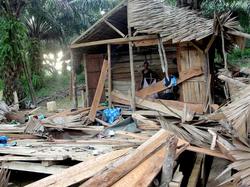How the women of Indonesia rose up against land grabbing
by Civita Patriana, YMKL

Land conflicts surely impact both indigenous men and women, but the burden often falls disproportionately on the latter. As food producers, knowledge holders, caretakers, healers, and keepers of culture, loss of access to valuable natural resources means a loss of self-reliance for the women, causing not only physical displacement but also economic and social difficulties.
One night in 2013, in East Borneo, the family of Lusang Arang was surprised by an unexpected visitor at their home. The visitor’s arrival at midnight was not the only thing that surprised the family; what he brought was even more startling: a large bag full of cash. Lusang Arang’s wife quickly decided what to do. She sneaked out and called out the other women of the village, who immediately gathered around the house, bringing their sleeping children in their arms. It was the guest’s turn to be surprised; he obviously didn’t expect a large audience at that time of night. The women all stood in front of the house and remained silent, the embodiment of their non-violence vision. They simply stared at the visitor until he decided to abort his mission to bribe Lusang Arang, the community’s customary head.
These women were part of the Long Isun community in Mahakam Hulu, which has resisted years of intimidation, violence, and pressure from the logging company Kemakmuran Berkah Timber (PT. KBT). In 2008, PT. KBT was granted a concession on the community’s ancestral lands without the community’s consent. This is not an isolated case, in a country where most indigenous communities hold land under customary tenure systems and lack formal titles, making them especially vulnerable to land grabbing. World Resources Institute (WRI) noted that the process for indigenous communities to secure formal land rights in Indonesia can be 15 years or more, while wealthy and politically connected companies can secure palm oil concessions within three to five years by taking advantage of legal loopholes.
These indigenous women are not standing idly by, however. They are increasingly taking action to protect their lands from external threats. Embracing their responsibilities as mothers and nurturers, the women of Long Isun have put themselves at the forefront of environmental protection. “We can give birth to our children but we cannot give birth to lands where our children will live and rely upon in the future,” is the view that drives Long Isun women’s fight for their ancestral lands, according to Martha Doq, the Director of Nurani Perempuan, a local NGO who has been assisting Long Isun community throughout their conflict with PT. KBT.
Promoting non violence
The women of Long Isun have also played a significant role in reducing violent actions in their territories, especially when the community is threatened by militarism. They have witnessed far too many community members being subject to violence by military personnel, and decided this needed to stop.
In 2014, Theodorus Tekwan, a Long Isun community member who has been a vocal advocate against land grabbing by PT. KBT, was falsely charged with halting the company’s operation. When police officers came to the village, the women turned themselves in and claimed that they were the ones responsible. They brought with them their children and domestic animals, such as pigs and hens. This peaceful gesture successfully delayed the capture of Tekwan, giving enough time for the community to come up with a strategy, and prevent police officers from using violent force to capture him.
In West Sumatra, the women of Nagari Simpang Tiga Koto Baru have also demonstrated peaceful resistance against an oil palm company which has established plantations in community areas for years. On several occasions these women have used their bodies as a human shield to block the company’s vehicles and heavy equipment from entering their disputed lands, and to demand negotiations with the company.
Innovative resistance
In Pasaman Barat District, West Sumatra, the women of Nagari Mandiangin have been in conflict with plantation companies for some time. They tapped into their local wisdom to ensure that their fight is financially sustainable. As a tradition, every week the people of Nagari Mandiangin collect a glass of rice, their main agricultural product, from each household to use as a collective resource. Realising that their fight against the two companies could be a long and onerous one, the women have been selling the collected rice to finance their resistance. This income also funded their march to the office of the Pasaman District Head in 2017 to demand local government attention.
Responding to the rampant practice of criminalisation, women of Rukam Village and Sungai Paur Village in Jambi Province, West Sumatra, have been exercising a meta legal approach to avoid criminalisation by a logging company. They have been planting company-claimed areas with paddy. Not only does this get around the “destroying and damaging company property” accusation, it is also a tactical approach to reclaiming the land.
For this year’s upcoming harvest season, the community plans to hold panen raya, or great harvest festival, to which they will invite neighbouring communities, government officials and company representatives. This will make their struggle a public concern by focusing attention on what they are fighting for (their livelihoods, as symbolised by paddy), rather than on what they are fighting against (the logging company). In this way, they hope to to garner public support for their cause.
This indigenous women’s movement has undoubtedly made a significant contribution to the fight against land grabbing in Indonesia. However, much more work is required to protect the rights of these women, and more importantly to ensure that they do not have to fight these battles in the first place.













